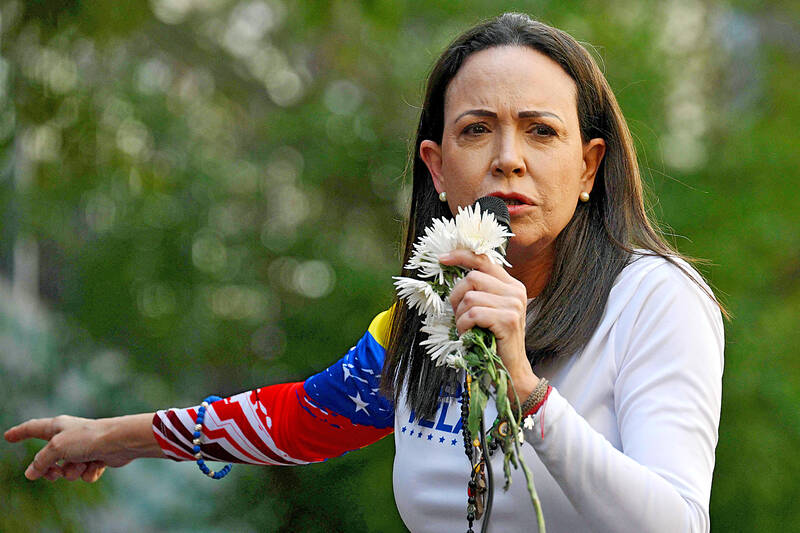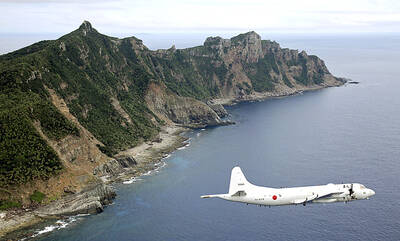The Nobel Peace Prize yesterday was awarded to Venezuela’s opposition leader and democracy advocate Maria Corina Machado, a “unifying” figure in what has become a “brutal” state, the Nobel jury said.
Woken in the middle of the night by a call from Norwegian Nobel Committee secretary Kristian Berg Harpviken, who informed her of the prize, the 58-year-old said she was confident the opposition would succeed in securing a peaceful transition to democracy in her country.
“We’re not there yet. We’re working very hard to achieve it, but I’m sure that we will prevail,” she told Kristian Berg Harpviken in a video of the call posted to X.

Photo: AFP
“This is certainly the biggest recognition to our people that certainly deserve it,” she said. “I am just, you know, one person. I certainly do not deserve this,” she added.
Machado, who has lived in hiding for the past year, was honored “for her tireless work promoting democratic rights for the people of Venezuela and for her struggle to achieve a just and peaceful transition from dictatorship to democracy,” said Jorgen Watne Frydnes, chair of the Norwegian Nobel Committee in Oslo.
The committee hailed her as “one of the most extraordinary examples of civilian courage in Latin America in recent times.”
“Despite serious threats against her life, she has remained in the country, a choice that has inspired millions,” it said.
Rumors have circulated on social networks that she is sheltering at the US embassy.
Machado was the opposition’s presidential candidate for Venezuela’s elections last year, but Venezuelan President Nicolas Maduro’s government blocked her candidacy.
Always dressed in white, she was welcomed like a rock star at rallies, her supporters rushing to get a glimpse or touch her, holding up babies and children, and proffering handwritten notes of support and presents of baseball caps or flowers.
Venezuela has evolved from a relatively democratic and prosperous country to a “brutal authoritarian state that is now suffering a humanitarian and economic crisis,” Frydnes said.
The opposition has been systematically suppressed by means of “election rigging, legal prosecution and imprisonment.”
Machado has been a “key, unifying figure in a political opposition that was once deeply divided,” he said.
She was not among those mentioned as possible laureates in the run-up to yesterday’s announcement.
US President Donald Trump had made no secret of his desire to win this year’s Peace Prize, and his office derided the decision as “politics over peace.”
“President Trump will continue making peace deals, ending wars, and saving lives,” White House Director of Communications Steven Cheung wrote on X.
The committee had made its choice days before the recent announcement of a deal to end the fighting in Gaza.
Nobel experts said that Trump had no chance, adding that his “America First” policies run counter to the ideals of the Peace Prize as laid out in Swedish inventor and philanthropist Alfred Nobel’s 1895 will creating the award.
Frydnes said the Nobel Committee is not swayed by lobbying campaigns for the prize.
“We base our decision only on the work and the will of Alfred Nobel,” he said.
The prize comes with a gold medal, a diploma and a prize sum of US$1.2 million.
It would be presented at a formal ceremony in Oslo on Dec. 10.

MISINFORMATION: The generated content tends to adopt China’s official stance, such as ‘Taiwan is currently governed by the Chinese central government,’ the NSB said Five China-developed artificial intelligence (AI) language models exhibit cybersecurity risks and content biases, an inspection conducted by the National Security Bureau (NSB) showed. The five AI tools are: DeepSeek, Doubao (豆包), Yiyan (文心一言), Tongyi (通義千問) and Yuanbao (騰訊元寶), the bureau said, advising people to remain vigilant to protect personal data privacy and corporate business secrets. The NSB said it, in accordance with the National Intelligence Services Act (國家情報工作法), has reviewed international cybersecurity reports and intelligence, and coordinated with the Ministry of Justice Investigation Bureau and the National Police Agency’s Criminal Investigation Bureau to conduct an inspection of China-made AI language

LIMITS: While China increases military pressure on Taiwan and expands its use of cognitive warfare, it is unwilling to target tech supply chains, the report said US and Taiwan military officials have warned that the Chinese People’s Liberation Army (PLA) could implement a blockade within “a matter of hours” and need only “minimal conversion time” prior to an attack on Taiwan, a report released on Tuesday by the US Senate’s China Economic and Security Review Commission said. “While there is no indication that China is planning an imminent attack, the United States and its allies and partners can no longer assume that a Taiwan contingency is a distant possibility for which they would have ample time to prepare,” it said. The commission made the comments in its annual

‘TROUBLEMAKER’: Most countries believe that it is China — rather than Taiwan — that is undermining regional peace and stability with its coercive tactics, the president said China should restrain itself and refrain from being a troublemaker that sabotages peace and stability in the Indo-Pacific region, President William Lai (賴清德) said yesterday. Lai made the remarks after China Coast Guard vessels sailed into disputed waters off the Senkaku Islands — known as the Diaoyutai Islands (釣魚台) in Taiwan — following a remark Japanese Prime Minister Sanae Takaichi made regarding Taiwan. Takaichi during a parliamentary session on Nov. 7 said that a “Taiwan contingency” involving a Chinese naval blockade could qualify as a “survival-threatening situation” for Japan, and trigger Tokyo’s deployment of its military for defense. Asked about the escalating tensions

DISPUTE: A Chinese official prompted a formal protest from Tokyo by saying that ‘the dirty head that sticks itself out must be cut off,’ after Takaichi’s Taiwan remarks Four armed China Coast Guard vessels yesterday morning sailed through disputed waters controlled by Japan, amid a diplomatic spat following Japanese Prime Minister Sanae Takaichi’s comments on Taiwan. The four ships sailed around the Senkaku Islands — known as the Diaoyutai Islands (釣魚台) to Taiwan, and which Taiwan and China also claim — on Saturday before entering Japanese waters yesterday and left, the Japan Coast Guard said. The China Coast Guard said in a statement that it carried out a “rights enforcement patrol” through the waters and that it was a lawful operation. As of the end of last month,